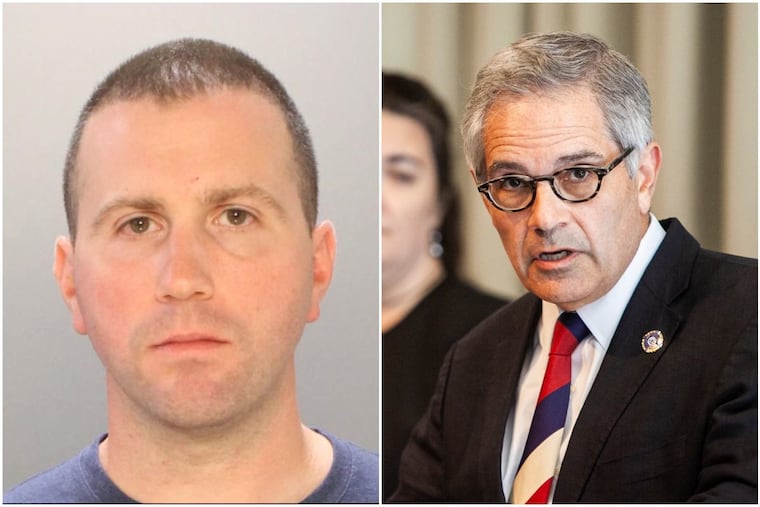Lawyers argue ex-Philly cop Ryan Pownall can’t get a fair trial in front of a city jury
Pownall's lawyers have argued that extensive media coverage of his case — the first prosecution in two decades of a former Philadelphia police officer over an on-duty shooting — would prevent him from receiving a fair trial in the city.

Lawyers for ex-Philadelphia Police Officer Ryan Pownall, the first former city cop to be charged over an on-duty shooting in two decades, want a judge to let them pick jurors from another county if the case reaches trial, arguing that an “avalanche of inflammatory media attention” has made it impossible for Pownall to receive a fair trial before a panel of city residents.
In a hearing Tuesday before Common Pleas Court Judge Barbara A. McDermott, lawyers Fortunato Perri Jr. and Charles Gibbs renewed claims they had made in a motion this month that described coverage of Pownall’s case as “sustained, pervasive, inflammatory" and “inherently prejudicial.” The attorneys also presented McDermott with a binder of media clips, including Inquirer stories, in a bid to support their claims.
But Assistant District Attorney Tracy Tripp argued that merely the existence of media coverage would not make it impossible to select impartial Philadelphians. In a court filing to the judge, she wrote that Pownall’s attorneys had made “a series of bald assertions regarding the extent, nature and impact" of the media coverage of the case.
McDermott did not rule on the issue Tuesday, but whatever she ultimately decides is likely to resolve one of the major trial issues in a case closely watched by members of the city’s criminal justice system. The prosecution, announced last year by reform-oriented District Attorney Larry Krasner, marks the first time since 1999 that a city cop has been charged over an on-duty shooting.
Pownall, 36, is accused of fatally shooting David Jones, 30, after a North Philadelphia traffic stop in June 2017. His lawyers have insisted that Pownall — who was fired over the shooting in September 2017 — was legally justified in his decision to pull the trigger. His trial is scheduled to begin in January.
The idea of empaneling an out-of-county jury is not unheard of: Earlier this year, an Allegheny County judge overseeing the homicide case against former East Pittsburgh officer Michael Rosfeld ruled that jurors should be selected from elsewhere due to the attention the case had received in Pittsburgh.
And in 2017 jurors in Bill Cosby’s first sexual-assault trial in Montgomery County were selected from Allegheny County after his defense lawyers at the time successfully argued that Cosby’s prosecution had received outsize local attention, in part because it had become an issue in the election for Montgomery County’s district attorney.
McDermott on Tuesday asked both sides to file additional legal arguments on the issues, including whether they believed the court should poll unrelated jury-duty participants before a possible trial to see how many have heard about Pownall’s shooting of Jones. The judge in Rosfeld’s case conducted similar polls before deciding to enlist an out-of-county jury.
McDermott is expected to rule on the questions by next month.
The last Philadelphia officer to be charged for using a weapon on the job, Christopher DiPasquale, was arrested in 1998 and 1999, but he was never tried because judges twice threw out manslaughter charges.
Krasner, sworn in last year, charged Pownall with murder in September, a decision leaders of the police union immediately called an “absurd disgrace."
The back-and-forth was just the latest example of fallout from the incident, which also led protesters calling for Pownall’s prosecution to disrupt city events and, at one point, march outside the ex-officer’s Bustleton home.
Krasner — formerly a career defense attorney who specialized in suing police over alleged misconduct — initially charged Pownall with a general count of murder, prohibiting his release on bail and allowing prosecutors to potentially seek a conviction that would require a mandatory life sentence.
But a judge later downgraded the charges against Pownall to third-degree murder, possessing an instrument of crime, and reckless endangerment.
Pownall has been free on bail since October, according to court records, and the decision to downgrade the charges eliminated the possibility of him serving a life behind bars.